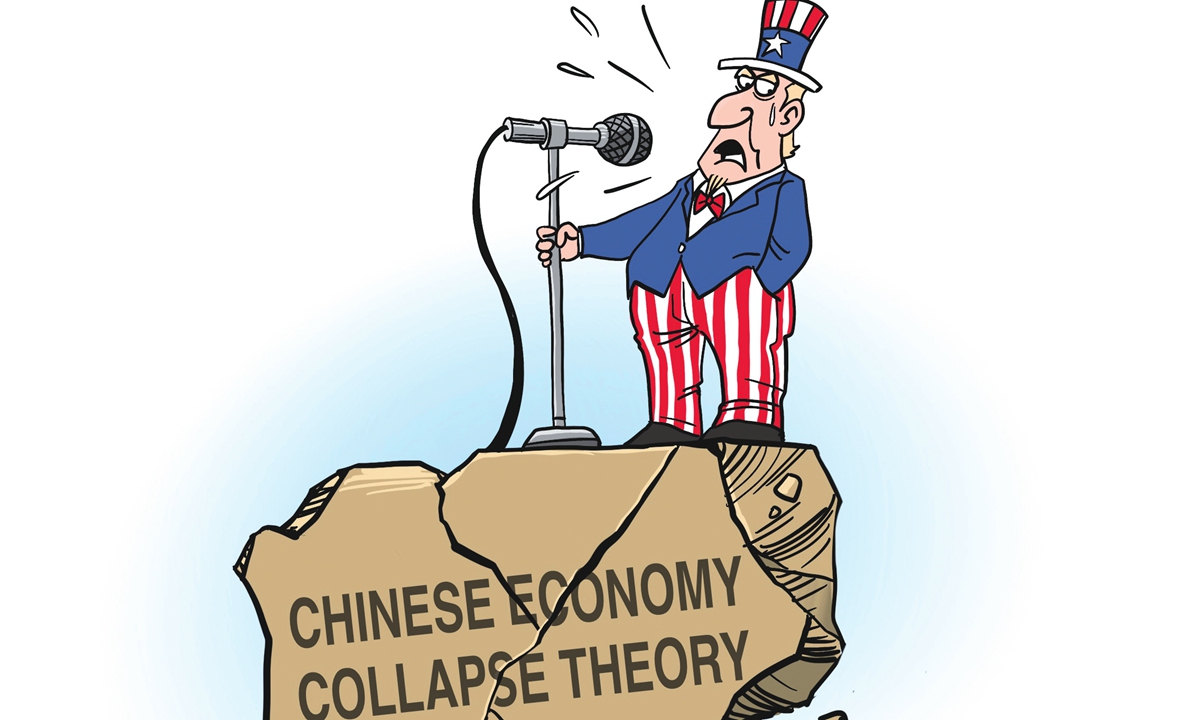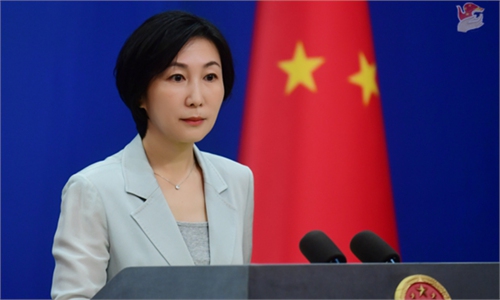
Illustration: Liu Rui/Global Times
Western media outlets and politicians have recently been singing a chorus on China's economy, clamoring how it is in trouble while maliciously attacking China's governance system.An article of Bloomberg, titled, "Democracies Versus Autocracies Isn't a Close Fight," published earlier this month, claims that the US has "a history of overestimating their authoritarian rivals" like China, and that "totalitarian enemies have a tradition of underestimating US capabilities." It also claims that democracy has a long winning streak despite all its maddening inefficiencies and contradictions, while most non-democratic states in modern history have suffered economically and existentially, because they "create inefficiencies, stifle innovation and quash the feedback mechanisms needed for effective governance." The article further asserts that the day when China's GDP surpasses that of the US may never come.
This narrative and viewpoint are filled with the arrogance and superiority complex of Western elites regarding their system. Driven by this kind of strong sense, they hold a bias against other systems, leading to increasingly paranoid perspectives.
China's continuous economic development has left Western countries feeling a loss of their superiority and increasingly worried. This sentiment, coupled with the challenges and problems that inevitably arise during China's economic recovery following the pandemic, has made some Americans believe it is an opportunity now for the US to badmouth China and its economy.
Is it impossible for China's GDP to ever surpass that of the US? Yu Xiang, a senior fellow at the Center for International Security and Strategy, Tsinghua University, told Global Times that such a statement is highly unscientific and arbitrary. China has achieved significant economic success and has already exceeded 60 percent of the US GDP. This implies the ruling power, the US, is no longer capable of containing the rising power, China. In this context, as long as China avoids major systemic mistakes, adheres to its established development path, and overcomes external interference and suppression, its economy is bound to achieve steady and long-term growth.
As globalization enters a new phase, some countries are starting to compete for capital and development resources. In the current global economic environment, which is filled with risks and uncertainties, the US is trying to shift attention from concerns about potential risks and economic prospects within the US by propagating negative narratives about China's economy and undermining confidence and expectations regarding China's growth. This is aimed at preventing capital from flowing into China, while drawing Chinese capital outflows and other capital back to the US, said Yu.
Faced with the Western media's portrayal of "democracies versus autocracies," it should be noted that China has its own form of democracy. The discussion is, therefore, in essence, not about "democracies versus autocracies."
Feng Yue, a researcher at the Institute of Political Science at the Chinese Academy of Social Sciences, told Global Times that China is developing the whole-process people's democracy, while the US is becoming more of a coercive and exploitative authoritarian state. Despite facing various issues within its own democracy, such as fierce partisan competition, the US has not engaged in self-reflection but has continually planned and executed "color revolutions" in many parts of the world, using democratic rhetoric to suppress other countries and pursue its own interests. Whenever a country disobeys, they resort to military coercion and repression, exacerbating international divisions and camp confrontations. Isn't this a blatant display of authoritarian behavior?
The decline of democracy, political infighting, money politics, and the erosion of freedom of speech have become hallmarks of US-style democracy. The elites in the US, however, seem to remain trapped in the illusion of the "end of history." While glaring problems exist in the US system, including identity politics, social polarization and wealth disparity, they lack the self-reflection and determination needed for reform due to their conflicting interests. It's not that rival nations have a tradition of underestimating US capabilities; rather, amid the arrogance and bad habits of US elites, the country overestimates its own capabilities.
In recent years, China's good governance and the US' poor governance have formed a stark contrast. China has pursued an innovation-driven development strategy, striving for self-reliance in high-level technology to promote high-quality economic growth. Particularly in the field of technological innovation, Huawei's success in breaking through comprehensive US containment measures has proven the failure and ineffectiveness of the US' strategy. China's economic future is bright and we must rely on our own innovation, ensuring technological independence.
Western countries are mired in economic and political quagmires, trying various methods to discredit their opponents, and hoping to find some consolation by bad-mouthing China. However, casting shadows over China's economy and system will not solve US' own problems. Overestimating their own capabilities will only accelerate their decline.
The author is a reporter with the Global Times. maruiqian@globaltimes.com.cn



